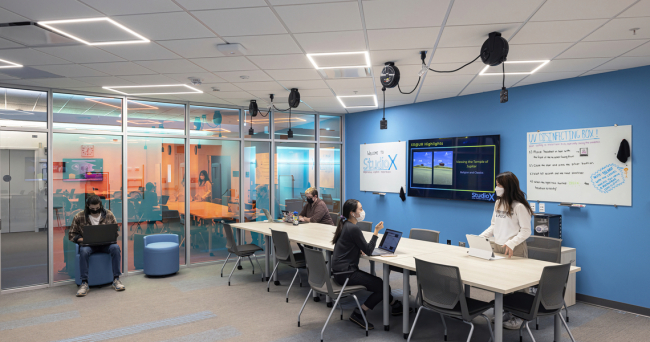
There aren’t many academic libraries that offer a space like Studio X. What is it, and how did the project begin?
The project began in fall 2017 when Lauren Di Monte joined our team and learned from the faculty that there was a lot of research activity in extended reality and other immersive technologies. We thought it was something the library could get involved in since we had close to 50 researchers engaged in XR technologies. So, we set out to better understand that landscape and how the researchers would engage with any initiative we developed, whether it was a space or specialized expertise. We knew a generic cave wouldn’t work for them, so we thought about what we may be able to do to help them tackle specific research questions. As it turned out, we pivoted to a space and service that would provide an easy on-ramp to those less familiar with these technologies and related needs.
Today, Studio X is a collaborative hub for extended reality where students and faculty are immersed in learning and teaching in ways that just aren’t possible without advanced technology. It’s a high-tech space that allows exploration, experimentation and experience that truly brings education to life.
What was the goal of Studio X? Who is it for?
The overall goal was to offer physical space, a program, services, technology and expertise that students and faculty needed—and expertise was really big. The user research told us that they wanted a space and experts in the space to teach them how to use and apply the technologies. We approached this goal by providing an on-ramp that made it easy for people to gain access to and experience with XR technologies.
Whether a person is an advanced researcher or a novice user, we’re good at helping people feel comfortable to explore their questions. The library is an interdisciplinary crossroads at the university, so it could be someone studying history, biomedical engineering, neuroscience, religion, ethics—whatever it is—if they’re interested in using XR technologies, we provide the support they need to feel welcome.

